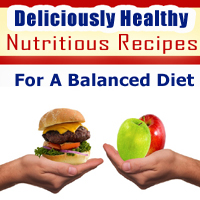


The Cornerstones Of Health And Wellness

Nutrient-rich foods are the bedrock of a healthy diet. They provide our bodies with the essential vitamins, minerals, fiber, and other nutrients needed for growth, maintenance, and overall well-being. These foods offer a powerful combination of taste, health benefits, and vitality, making them a fundamental element of a balanced lifestyle.
The Essence Of Nutrient Density: Nutrient-rich foods are characterized by their high nutrient density. This means they pack a significant amount of essential nutrients per calorie, giving you the most "bang for your buck" in terms of health. These foods are not empty calories but are abundant sources of vitamins, minerals, antioxidants, and other valuable compounds.
Variety Of Nutrient-Rich Foods: The world of nutrient-rich foods is diverse and versatile. It includes:
Fruits And Vegetables: Fruits and vegetables are teeming with vitamins, minerals, and dietary fiber. They offer a wide range of colors, flavors, and textures, making it easy to incorporate them into your daily meals.
Whole Grains: Whole grains like brown rice, quinoa, and whole wheat provide complex carbohydrates, fiber, and essential nutrients that support sustained energy and overall health.
Lean Proteins: Lean sources of protein, such as skinless poultry, fish, tofu, and legumes, are low in saturated fat and supply your body with essential amino acids for muscle growth and repair.
Dairy Or Dairy Alternatives: Low-fat or non-fat dairy products, along with dairy alternatives like almond milk and soy products, offer calcium and other nutrients for strong bones and teeth.
Nuts And Seeds: Nuts and seeds are rich in healthy fats, protein, fiber, and essential vitamins and minerals. They make for a satisfying and nutrient-dense snack.
Health Benefits Of Nutrient-Rich Foods: Consuming a diet rich in nutrient-dense foods is associated with a myriad of health benefits. Here are a few:
Heart Health: Nutrient-rich foods help maintain healthy blood pressure, reduce bad cholesterol levels, and support overall cardiovascular health.
Weight Management: These foods tend to be lower in calories while being more filling, making it easier to maintain or achieve a healthy weight.
Gut Health: High-fiber foods, like fruits and vegetables, support a healthy gut microbiome, aiding digestion and nutrient absorption.
Bone Health: Nutrient-rich foods with calcium and vitamin D, such as dairy and leafy greens, promote strong bones.
Cognitive Function: Certain nutrients, like omega-3 fatty acids found in fatty fish, are associated with improved cognitive function.
Incorporating Nutrient-Rich Foods: Incorporating nutrient-rich foods into your diet doesn't have to be daunting. Small changes can lead to significant improvements in your nutrition. Start by:
Filling Half Your Plate With Vegetables And Fruits: This simple guideline helps ensure you're getting a variety of nutrients in every meal.
Choosing Whole Grains: Opt for whole grain bread, pasta, and rice instead of their refined counterparts.
Adding Lean Proteins: Incorporate lean proteins into your diet, whether through poultry, fish, beans, or tofu.
Snacking Smart: Opt for nutrient-dense snacks like nuts, yogurt, or fresh fruit.
Hydration: Don't forget the importance of water, another vital nutrient that supports overall health.
Nutrient-rich foods are your allies on the journey to better health and wellness. By focusing on these foods, you can savor the benefits of a balanced diet, improved vitality, and a lower risk of chronic diseases. Embrace the colorful array of fruits, vegetables, and other nutrient-dense choices, and you'll find that healthful eating can be both delicious and rewarding.
Embracing Simplicity In A Complex World
 Embracing Minimalism: At its core, "back to basics" promotes minimalism. It encourages people to declutter their lives, both physically and mentally. Minimalism is about focusing on what truly matters and eliminating the excess. It's the realization that more possessions, busyness, or complexity do not necessarily lead to greater happiness or fulfillment.
Embracing Minimalism: At its core, "back to basics" promotes minimalism. It encourages people to declutter their lives, both physically and mentally. Minimalism is about focusing on what truly matters and eliminating the excess. It's the realization that more possessions, busyness, or complexity do not necessarily lead to greater happiness or fulfillment.
Simplicity In Daily Living: In a world of constant distractions and information overload, "back to basics" encourages us to simplify our daily routines. This could mean cultivating habits like mindfulness, time management, and gratitude. It's about savoring the present moment, fostering deep connections, and finding joy in life's simple pleasures.
Health And Well-Being: The "back to basics" approach extends to health and well-being. It advocates for a return to whole, unprocessed foods, regular exercise, and stress reduction techniques. Prioritizing a balanced, natural diet and physical activity can lead to improved physical and mental health, reducing the reliance on pharmaceutical interventions.
Health And Dietary Considerations
 Health Benefits
Health Benefits
For individuals with celiac disease or gluten sensitivity, adopting a gluten-free lifestyle is non-negotiable. Consuming gluten can lead to severe health consequences and discomfort. However, even for those without these conditions, there are potential health benefits to going gluten-free.
Some people report improved digestion, increased energy, and reduced gastrointestinal discomfort when they eliminate gluten from their diets. This could be attributed to the fact that many gluten-containing foods are also highly processed and high in refined carbohydrates. A gluten-free diet can encourage individuals to choose more whole and naturally gluten-free foods like fruits, vegetables, lean proteins, and legumes.
Nourishing, Efficient, And Satisfying
 Financial Savings: Meal preparation can save money. Eating out at restaurants or ordering takeout can be expensive, and the costs add up over time. Meal preparation allows you to buy ingredients in bulk, plan cost-effective meals, and reduce food waste. It's a budget-friendly approach to dining.
Financial Savings: Meal preparation can save money. Eating out at restaurants or ordering takeout can be expensive, and the costs add up over time. Meal preparation allows you to buy ingredients in bulk, plan cost-effective meals, and reduce food waste. It's a budget-friendly approach to dining.
Reduced Food Waste: Meal preparation encourages thoughtful planning, which can help reduce food waste. You can buy ingredients with specific recipes in mind, use leftovers creatively, and ensure that perishable items are consumed before they go bad. This contributes to a more sustainable and eco-friendly way of eating.
Variety And Convenience: Meal preparation doesn't mean eating the same dish every day. With careful planning, you can enjoy a diverse menu throughout the week. You can also pack ready-to-eat meals for work, travel, or outings, ensuring that you always have a satisfying and nutritious option on hand.
A Recipe For Health And Sustainability
 Health Benefits: Organic cooking prioritizes the quality and nutritional value of ingredients. Here are some key health benefits associated with organic cooking:
Health Benefits: Organic cooking prioritizes the quality and nutritional value of ingredients. Here are some key health benefits associated with organic cooking:
Nutrient-Rich Ingredients: Organically grown foods tend to be richer in essential nutrients, such as vitamins, minerals, and antioxidants. This means that meals prepared with organic ingredients can provide a more substantial nutritional punch.
Avoiding Harmful Chemicals: Organic cooking eliminates the risk of ingesting synthetic pesticides and herbicides commonly found on conventionally grown produce. These chemicals have been linked to various health issues, making organic options a healthier choice.
Reduced Exposure To Antibiotics And Hormones: Organic meats and dairy products come from animals that are raised without antibiotics and synthetic hormones. By consuming organic animal products, you reduce your exposure to these potentially harmful substances.
Better For Allergies: Organic foods have been reported to be less likely to trigger allergies due to their lack of synthetic chemicals and genetically modified ingredients.
Sustainability And The Environment: Organic cooking is not only beneficial for your health but also for the planet. Sustainable farming practices that go hand-in-hand with organic cooking have several environmental advantages:
Elevating Your Life For A Brighter Tomorrow
 One of the cornerstones of lifestyle enhancement is prioritizing physical health. Regular exercise, a balanced diet, and adequate sleep are fundamental. Engaging in physical activities you enjoy, whether it's a daily walk, yoga, or team sports, can be a source of not only fitness but also joy.
One of the cornerstones of lifestyle enhancement is prioritizing physical health. Regular exercise, a balanced diet, and adequate sleep are fundamental. Engaging in physical activities you enjoy, whether it's a daily walk, yoga, or team sports, can be a source of not only fitness but also joy.
Diet plays a crucial role in overall well-being. Opting for whole, unprocessed foods and staying hydrated can make a significant difference in how you feel on a daily basis. Balance is the key; it's essential to allow for occasional indulgences while maintaining a predominantly nutritious diet.
Mental And Emotional Wellness
An enhanced lifestyle also places a strong emphasis on mental and emotional well-being. Mindfulness practices, such as meditation and deep breathing exercises, help manage stress and increase mental clarity.
Nourishing Your Body One Sip At A Time
 Antioxidant Benefits
Antioxidant Benefits
Antioxidants are nature's superheroes when it comes to fighting off free radicals and preventing cellular damage. Nutrient-packed beverages frequently contain an abundance of antioxidants sourced from fruits, vegetables, and other plant-based ingredients. These antioxidants help protect our bodies from oxidative stress and reduce the risk of chronic diseases.
Weight Management And Digestive Health
Nutrient-packed beverages can be a valuable tool for those looking to manage their weight. A well-balanced smoothie or juice can provide satiety while keeping calories in check. Additionally, they often include dietary fiber, which supports healthy digestion and promotes a feeling of fullness.